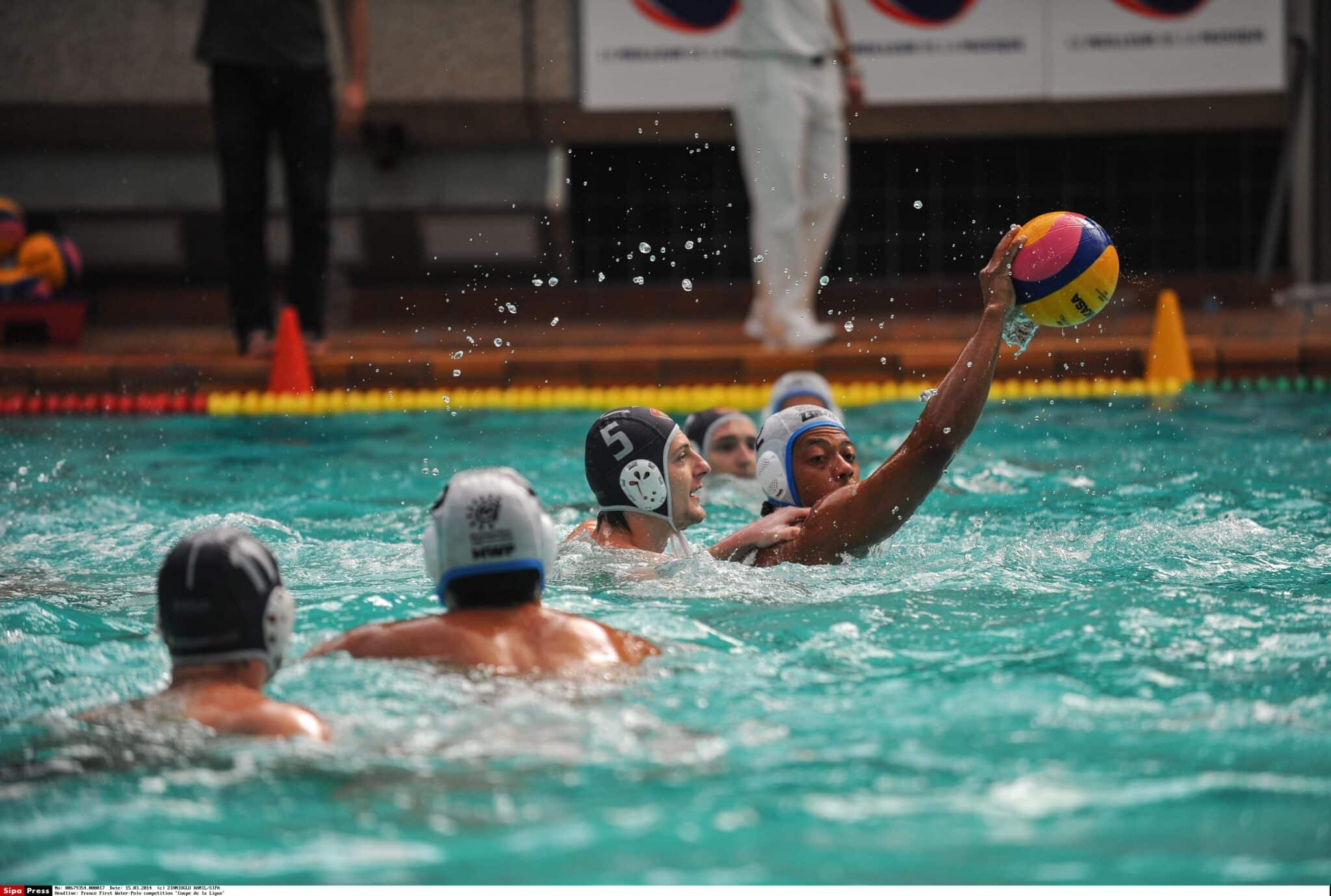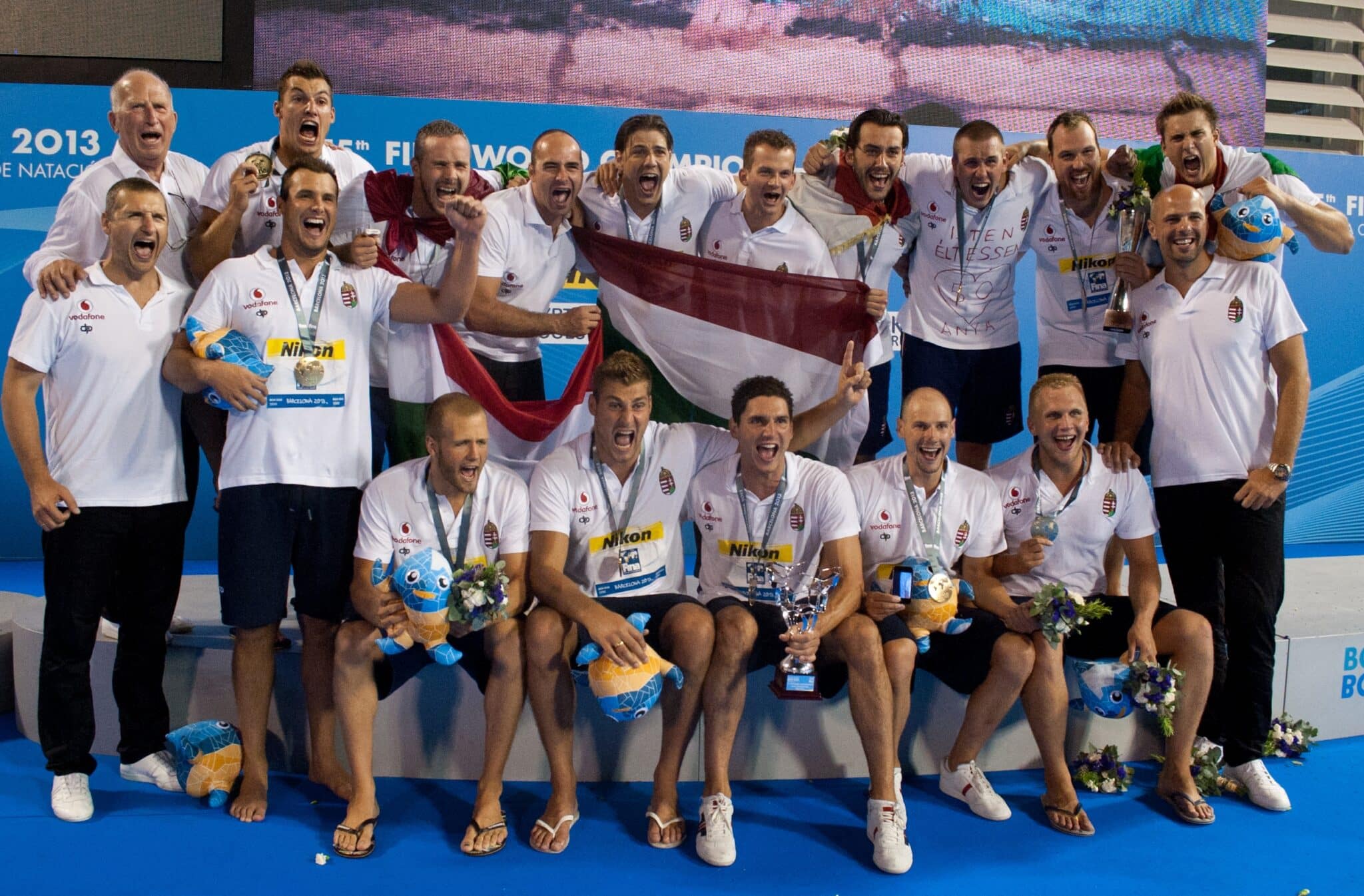Although water polo is a relatively new sport, it quickly gained popularity and was among the first team sports to be introduced at the 1900 Olympic Games. While Great Britain dominated the following two decades, Hungary first scored a gold medal at the 1932 Los Angeles games and the men’s team is currently at the top of the medal table with 9 Olympic gold medals and 3 silver and bronze medals each.
Water polo is another sport that evolved and was codified in Great Britain during the 19th century, besides football, cricket, tennis, badminton and rugby. Originally a form of “water rugby” played in the rivers and lakes of England and Scotland, it came a long way in terms of technique: early play allowed brute strength, wrestling and holding opponents underwater to recover the ball. The goalkeeper used to stand outside the playing area on a deck and defended the goal by jumping in on any opponent attempting to score by placing the ball on the deck.
A Scottish swimming instructor and coach, William Wilson drew up the rules for a team water game that he called “aquatic football” in 1877. A few years later the Swimming Association of Great Britain recognized the game, expanded Wilson’s rulebook and water polo soon spread to Europe, America and Australia. Around 1900, various teams competed in Germany, Austria, France, Belgium, Hungary and Italy, playing according to British rules, but in the United States water polo was characterised by rough play, holding and diving underwater. It was played with a soft ball that could be carried underwater but by 1914 the American teams also conformed to the internationally accepted rules.
The first women’s water polo game was played in Holland in 1906 but it wasn’t until the second half of the 20th century that it became more wide-spread. In 1979 the first World Cup for women was organized and in 2000 it became an Olympic sport in Sydney, where the Australian team took the gold home.
Water polo rules in a nutshell

Water polo is played in a pool at least 1.8 metres deep, in which the players swim or tread water continuously. Teams consist of 6 field players and a goalkeeper, with up to 6 substitute players. Games are divided into four quarters lasting 8 minutes each, but the game clock is stopped when the ball is not ‘in play’: between a foul and the following free throw and between a goal and the restart. As a result, an average quarter lasts around 12 minutes. Players swim around 3 kilometres during a match.
The goals are 3 metres wide and 90 cm high. Water polo balls are generally yellow and of varying size and weight for men (circumference of 68-71cm) and women (circumference of 65-67cm). Teams are allowed to possess the ball for 30 seconds unless they shoot for the goal. If they fail to do so, possession passes to the other team. However, if a team shoots and regains control of the ball within the allotted time, the shot clock is reset to 30 seconds.
Players can move the ball by throwing it to their teammates or swimming with the ball in front of them. Only goalies are allowed to hold the ball with both hands within the five metre area of their own goal and no one is supposed to push the ball underwater. Players must not impede or otherwise prevent the free movement of an opponent who is not holding the ball, and no pushing, pulling or sinking are allowed.
Since water polo is quite an aggressive sport, various fouls are punished depending on severity. Two referees try to keep an eye on the players and maintain order in the pool. Mild grabbing and pushing are very common and are considered minor fouls, to be followed by a free pass if a defender commits the foul. If it is the offense who commits minor foul, the ball changes possession with a free pass.
Major fouls are aggressive grabbing, kicking, pushing and preventing movement. In these cases the attacking team is awarded a free pass and the defending team must send a player out of the game for 20 seconds or until a possession change. But if a major foul is committed within the 5-metre line, preventing a probable goal, a penalty shot is awarded. Brutality fouls, when malicious kicking or striking occurs, are punished by a four-minute exclusion from the game. If they take place during actual play, a penalty shot from the 5-metre line is awarded.
The Hungarian men’s national team

Our national team is considered the world’s top power in the history of water polo, and rightly so. Boasting of 9 Olympic gold and 3 silver and bronze medals each; 3 World Championship gold, 6 silver and 1 bronze medals; 3 World Cup gold and silver medals each plus 2 bronze medals; and coming 1st in 12 and taking 2nd and 3rd places in 5 European Championships, the Hungarian team are the uncrowned kings of this sport.
Since Budapest is hosting this year’s European Championship (14-27 July), many supporters would love to see the team bag the gold. They aren’t off for an easy start though, since they will face Serbia, Germany, Croatia, France and Spain in their group of six. The other group includes Montenegro, Italy, Greece, Romania, Russia and Georgia. The first three teams of both groups qualify to compete for the championships.
Dezső Gyarmati, the most successful water polo player of all time

The three-time Olympic champion and coach of the national team was born in Miskolc in 1927 and passed away last August, aged 85. He participated in five Summer Olympics from 1948 to 1964 and received 3 gold, a silver and a bronze medal. As one of the fastest water polo players of the time and left-handed, Gyarmati proved to be an invaluable member of the team. He played a total of 108 matches on the national team and was able to play in all positions.
He was captain of the team during the infamous “Blood in the Water” match against the Soviet Union in 1956. The national team faced them in Melbourne with the knowledge that the Hungarian Revolution had been suppressed by USSR troops. With Hungary leading 4-0, a Russian player punched Ervin Zádor in the face, who left the pool with a bleeding cut. The referees were forced to stop the match with one more minute to go to prevent a riot, since the spectators were outraged. The Hungarian team showed amazing presence of mind and went on to win the Olympics.
Under Gyarmati’s coaching, the Hungarian national team bagged an Olympic gold in 1976 (Montreal), a silver in 1972 (Munich) and a bronze in 1980 (Moscow). In 1976 Gyarmati was inducted into the International Swimming Hall of Fame and received the title of Athlete of the Nation in 2004.
to evolve – kialakulni, kifejlődni
to be codified – leírják a szabályait
in terms of – valami szempontjából
strength – erő
wrestling – birkózás
goalkeeper – kapus
opponent – ellenfél
to recognize – elismerni
rough – durva
to conform to – alkalmazkodni valamihez
to tread water – taposni a vizet
substitute player – cserejátékos
quarter – negyed
foul – szabálytalanság
free throw – szabaddobás
goal – kapu (sport)
circumference – kerület
to fail – nem sikerül valakinek valami
allotted – kijelölt
to impede – akadályozni
severity – súlyosság
referee – bíró (sport)
grabbing – megragadás, lefogás
defender – védő
offense – támadás
possession change – labdabirtoklás változás
penalty shot – büntetődobás
striking – ütés
exclusion – kizárás
rightly – jogosan
to qualify – továbbjutni
coach – edző
to pass away – elhunyni
of the time – korabeli
infamous – hírhedt
to be forced to – kénytelen valamit megtenni
to prevent – megakadályozni
riot – zavargás
presence of mind – lélekjelenlét
Hall of Fame – hírességek csarnoka




